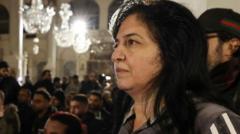Protests have erupted in Syria in light of a recent incident involving the burning of a Christmas tree in Suqaylabiyah, a town predominantly inhabited by Christians near Hama. A video circulated on social media showed masked gunmen setting the festive tree ablaze, inciting outrage among local communities. The leading Islamist faction, which played a significant role in the recent uprising that led to President Bashar al-Assad's downfall, stated that the culprits were foreign fighters who have since been detained, pledging to restore the tree promptly.
Demonstrations took place across the nation, with many citizens calling for the new ruling authorities to ensure the safety and rights of religious minorities. In Damascus, protesters gathered in the Bab Touma neighborhood, displaying a cross alongside Syrian flags and chanting, "we will sacrifice our souls for our cross." One protester, identified as Georges, expressed the sentiment of many, stating, "If we're not allowed to live our Christian faith in our country, as we used to, then we don't belong here anymore."
Syria’s demographic landscape is characterized by a rich tapestry of ethnic and religious groups, such as Kurds, Armenians, Assyrians, Christians, Druze, Alawite Shia, and the Arab Sunnis, who form the majority Muslim population. Following the recent overthrow of Bashar al-Assad's presidency, which lasted over five decades, uncertainty looms over how the Hayat Tahrir al-Sham (HTS) group will manage governance. While HTS has distanced itself from its jihadist roots, it remains a designated terrorist organization by several governments.
The group's leaders have assured the public of their intent to build a Syria that accommodates all its citizens and guarantees the rights of ethnic and religious minorities. However, the challenge of ensuring security amidst the existing threats posed by foreign fighters and extremist groups like ISIS continues to cast a shadow on the country's future. The US recently lifted a bounty on HTS leader Ahmed al-Sharaa, suggesting a possible shift in diplomatic relations, while maintaining its military engagement in the region. The fate of Syria's minorities remains uncertain as they seek stability in a rapidly evolving political landscape.


















